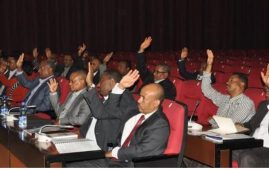Chatting with me about the ongoing public fundraising for the Grand Ethiopian Renaissance dam, a westerner acquaintance of mine said, ‘I understand there is a lot of sentiment on this issue…..[but] giving up a month salary looks weird to a ferenji’(a local term for a white westerner).
It may sound weird to someone who is endowed with a functioning state apparatus. But not for Ethiopians, who are accustomed to, what I call, ‘governance by fundraising’ to meet the costs of the frequent internal or external wars – perhaps, since the second half of the last millennium. The Dergue regime’s year on year demand for public contributions to finance its war machine is of recent memory. Even the practice of collecting a portion of civil servants’ salary for ‘developmental works’ is as old as Emperor Haileselasie’s era.
Residing on a mostly peaceful era, the incumbent party, EPRDF, sought to transform the practice into a permanent source of finance its infrastructural endeavors. A typical example is the Local Development Agencies(LDA), which has been established in most local urban governments in the last decade, with the objective of constructing latrine, byroads, and the like, mobilizing up to 40% of the fund from the locality. The rural version of this is the free and partly free labor service schemes for rural road constructions and environmental projects.
What is more familiar to my readers is the televised live telethon fundraising programs organized at various times in the last two decades – in which regional development associations mobilized hundreds of million Birr. The less noticed part of the events is that a significant portion of the amount is raised from civil servants in the week preceding or following the telethon. The untold part of the story is that while the businessmen who made pledges on the telethon drag their foots, the civil servants deliver on time. But that is not because the latter are more virtuous.
This takes us to the second issue – how the fundraising is conducted.
For more than a month after the inauguration of the Renaissance dam project – on April 2, the state media had been busy reporting the pledges made by civil servants across the country. That is the pledge to donate a month salary made in the meetings held in their respective workplaces.
The format of those meetings is more or less the same. Since Civil Servants have no labor union whatsoever, they take a short break from work to hold a meeting, which is summoned and attended, but not necessarily chaired, by a senior official in the respective institution.
The presence of senior officials helps to silence ‘rebel souls’ or any ‘nitpicking’ on the issue. But that is not what does the magic.
First, there is a established mode of thinking that can be summarized as ‘the government is requesting something…and it should be attended’. The government is some kind of father figure whom you don’t want to let down.
Second, there is a pervasive attitude that can be summed up as ‘what works for the majority, works for everyone’. This is more than mere peer pressure rather a sort collectivized thinking.
Third, there is a long-standing tradition of ‘governance by fundraising’ which I noted above. Asking for your money is deemed so legitimate that the government is not much expected to demonstrate that it has exhausted alternative means of generating revenue. To the contrary, those who hesitate to donate are reminded of their wasteful spending.(Meaning: any thing that don’t fit the Marxian list of basic necessities)
With the three elements in place, the government need only to come up with a banner strong enough to generate an emotive support from the majority – at least something that many don’t want to be seen opposing.
There you have it.
The fundraising meeting in no time moves to debating the size of donation – but the standard would already be set by media report similar events.
This was the trend with the new dam project.
First, the Prime Minister urged the public to buy the treasury bond, during his live transmitted speech on the inauguration of the project. Then, there were state media programs where ordinary citizens opined that the public should do more than buying bond. In less than a week time, private media reported about individuals who bought the bond without interest.
Just 6 or 8 days after the launching of the new dam, civil servants of a smaller eastern town in the eastern part of the country torched the salary donating thing and, in the process, set the benchmark for it.
All the rest salary donation news stories could have as well been written in advance.
Being aware of the process, I wanted to comment on it as soon as I read the first news of salary donation. In fact, I thought it would be the right time, since the issue is a national one and my comment wouldn’t be interpreted otherwise- as it could be in case of a fundraising scheme for a regional development association.
But I started having second thoughts when students at different departments of Dire Dawa University decided to buy a bond in self-initiated class meetings. That was less than 15 days after the launching of the dam and I was aware that the University had not yet establish a coordinating committee – let alone cajole the students into such a commitment.
I thought, perhaps Abay (Blue Nile) is so unique and my criticisms might be misplaced.
There were three sort of criticism in the media, however.
The first came from the opposition in the Ethiopian diaspora, which claimed the government is forcing the public to donate their salary and buy bond. It was apparently a ploy to misled westerners, like my ferenji friend, for whom the process might appear fishy. So far, it doesn’t seem to have worked.
The second sort were a procedural one. It could be represented by Addis Fortune’s April 24 cartoon (see the picture). It is meant to criticize the fact that the meetings to donate salary were not attended by all concerned civil servants, thus some of them find out from media. Of course, there was a press statement issued by the opposition party, All Ethiopian Unity party(AEUP), that claimed ‘the decisions are taken by the management committee’, thus the party ‘is not certain if the civil servants consented to it’. – AEUP is probably referring to a minority of the cases.
I bet all the above mentioned criticism would be silenced if the salary donation decision were taken by a meeting which is attended by all the civil servants in the concerned institution.
Though the critics didn’t ask for it, they would be contented if the decision was taken by a vote and higher officials were not in attendance.
But that wouldn’t have changed the outcome. Especially with regard to the new dam, which enjoys a public sentiment bordering a war-time frenzy.
Let me illustrate: I have decided to donate a month salary in a meeting I was not present. When my colleagues informed me a few days later, I suggested the decision should have been to buy the bond rather than giving away a month salary. A few minutes later, I was desperate to take it back. My colleagues took turns to give me lengthy sermons indicating my salary is nothing compared to the cost of the dam, subtly pointing to my ‘extravagance’, informing me the the debate was not on buying the bond but on whether to donate a month’s salary in a 12 months or 5 months salary in a spread of 5 years.
Finally, the irritating Ethiopian question came – ‘why do you want to be different?’.
But the question should have been: Why should one be clustered with a group of people with whom she has no formal association? Even if civil servants had a labor union, the issue would likely be beyond its mandate.
The prevailing collectivized thinking is so convenient both to the government and the self-proclaimed liberal democrat opposition groups, none of them wish to challenge it. In fact, it is the main mode of supporter mobilization of most, if not, all political parties. That is why the critics didn’t go beyond procedural questions.
[The foregoing discussion was drafted two months ago. There were two notable developments since.]
In mid-May, Dagnachew Assefa(PhD), an instructor at the Philosophy Department, criticized the manner in which the decision to donate a month salary was taken in the campus community meeting, in an open letter to the President of Addis Ababa University(AAU). His problem was that the President, who chaired the meeting, took the offer made by a few individuals as if it is of the entire staff without tabling it for vote.
How come the Philosophy instructor find it appropriate to see a group of people voting on his salary?
Perhaps, as his open letter indicates, he saw the issue in the context of Rousseau’s notion of ‘General Will’, in which the public good is to prevail on narrow and selfish individualism. Whatever the merit of Rousseau’s concept, it is unfit for this case. First, the issue at hand is whether and how much to donate for the new dam. It is not whether to build a dam or not. Or, more aptly to Rousseau’s concept, it is not a decision on whether to use a renewable source of energy. To the contrary, the size of donation is befitting of a case by case, thus individualized, decision.
Secondly, if the donation issue is said to be decided collectively, then the appropriate collectivity is the whole citizenry. Then, the decision will have to e taken by a referendum or by the parliament. Which would in effect be an 8.4% additional income tax. One may also propose a meeting of individuals with similar income and/or expenditure to collectively decide on the appropriate level of donation. This would be a complicated scheme. More importantly, it misses the voluntary feature of donation. Otherwise, the decision to build the dam and to finance it from public treasury has already been made by the government.
Am I missing something here? This was a question, which in part delayed this article for weeks.
In June, the government took a curious turn. Civil Servants are asked to confirm their consent by signing on a paper being circulated in their respective institution. This is a commendable move as it satisfies the legal requirement that a salary can not be withheld except by law, by a court decision or the consent of the concerned individual. It is probably a first of its kind with regard to government sponsored fundraising activities in the civil service. Now the Ministry of Finance and Economic Development could withheld 1/12th of the salary budget when it disburses the budget of the next fiscal year on mid-July.
This must satisfy Dagnachew and all other critics of the fundraising.
Yet, my qualms remain unaddressed. As the implications of the government’s move is not clear.
Is the signature in lieu of the voting that didn’t take place during the earlier meetings?
Or, is it a turn to an individualized fundraising format - where everyone decides for herself on whether to donate and its size?






An all round amazingly written piece!
Aye..EPRDF
It denies in public…then silently fix ..the problem.
better than nothing
It is a nice piece. However, you didn’t streess enough on the actual or perceived threat feard by the civil serevnts affecting their decision to donte or not.
What is your point? do you have any?
Thankyu..daniel. for your openness. From the start we knew the problem was neolieral selfishness not democracy.
you made it very clear.
No worry Ethiopia are together and will sacrifice!!!!